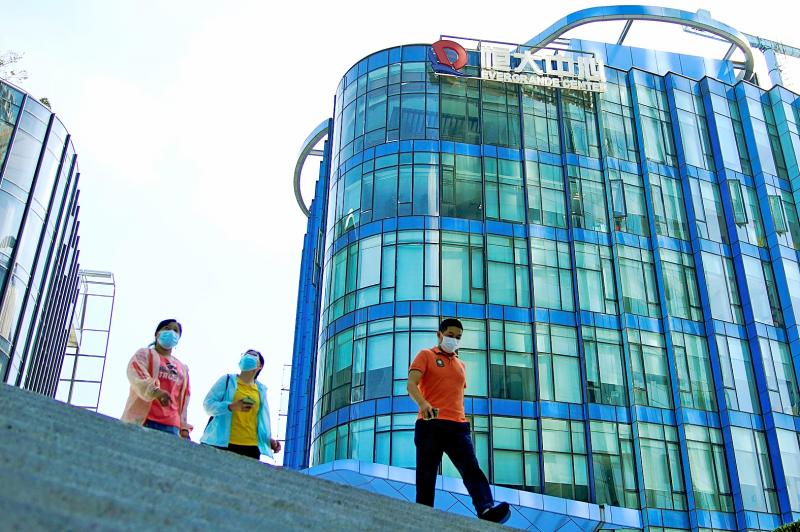Embattled Chinese property titan Evergrande Group (恆大集團) yesterday said that it has agreed on a deal with domestic bondholders that should allow the conglomerate to avoid missing one of its interest payments and avoid default, but its deeper debt burden remains.
In a statement to the Shenzhen Stock Exchange, Evergrande’s property unit Hengda Real Estate Group Co (恆大地產) said that it had negotiated a plan to pay interest due on its 232 million yuan (US$35.9 million) 2025 bond.
Evergrande has admitted facing “tremendous pressure” as it tackles a debt pile of more than US$300 billion, and has said it might not be able to meet its liabilities.

Photo: Reuters
The group has made no mention of its repayments on interest for an offshore bond due today. While that leaves open the chance it could miss payment on that, it would still have a 30-day grace period before it is deemed in default.
In yesterday’s statement, Hengda said that investors “who bought and held the bonds” before yesterday “are entitled to interest paid this time.”
Evergrande did not reply to requests for comment.
Analysts said the repayment would go some way to soothing anxious markets in the short term.
However, “for confidence to return more meaningfully, it will need the market to see sight of the broad restructuring plans for Evergrande,” Global CIO Office chief executive officer Gary Dugan told Bloomberg News.
Given the company’s debt pile, analysts and investors have speculated that the government would likely step in with some kind of help for the corporate giant, although Beijing has so far remained mute on the crisis.
Meanwhile, the vagueness of the filing — which did not give details on how much it would pay and when — left some warning that there remained a lot to overcome.
The payment announcement “is likely only a temporary reprieve with no signals from the Chinese government over what steps, if any, it will take to assist an orderly wind down or restructuring,” Oanda Corp analyst Jeffrey Halley said.
Nonetheless, news of the deal provided support to equities yesterday, with Shanghai leading most Asian markets up, even as traders returned from a long weekend break to play catch up with Monday’s global rout.
China’s central bank also injected 90 billion yuan into the banking system, in a sign of support as the country’s financial markets reopened and steadied after a two-day break for the Mid-Autumn Festival.
Despite the looming default, some funds have been increasing their positions in recent months. BlackRock Inc and investment banks HSBC Holdings PLC and UBS Group AG have been among the largest buyers of Evergrande’s debt, Morningstar data and a blog post showed.
Other bondholders include UBS Asset Management and Amundi SA, Europe’s largest asset manager.
Additional reporting by Bloomberg

CHIP RACE: Three years of overbroad export controls drove foreign competitors to pursue their own AI chips, and ‘cost US taxpayers billions of dollars,’ Nvidia said China has figured out the US strategy for allowing it to buy Nvidia Corp’s H200s and is rejecting the artificial intelligence (AI) chip in favor of domestically developed semiconductors, White House AI adviser David Sacks said, citing news reports. US President Donald Trump on Monday said that he would allow shipments of Nvidia’s H200 chips to China, part of an administration effort backed by Sacks to challenge Chinese tech champions such as Huawei Technologies Co (華為) by bringing US competition to their home market. On Friday, Sacks signaled that he was uncertain about whether that approach would work. “They’re rejecting our chips,” Sacks

Taiwan’s exports soared 56 percent year-on-year to an all-time high of US$64.05 billion last month, propelled by surging global demand for artificial intelligence (AI), high-performance computing and cloud service infrastructure, the Ministry of Finance said yesterday. Department of Statistics Director-General Beatrice Tsai (蔡美娜) called the figure an unexpected upside surprise, citing a wave of technology orders from overseas customers alongside the usual year-end shopping season for technology products. Growth is likely to remain strong this month, she said, projecting a 40 percent to 45 percent expansion on an annual basis. The outperformance could prompt the Directorate-General of Budget, Accounting and

NATIONAL SECURITY: Intel’s testing of ACM tools despite US government control ‘highlights egregious gaps in US technology protection policies,’ a former official said Chipmaker Intel Corp has tested chipmaking tools this year from a toolmaker with deep roots in China and two overseas units that were targeted by US sanctions, according to two sources with direct knowledge of the matter. Intel, which fended off calls for its CEO’s resignation from US President Donald Trump in August over his alleged ties to China, got the tools from ACM Research Inc, a Fremont, California-based producer of chipmaking equipment. Two of ACM’s units, based in Shanghai and South Korea, were among a number of firms barred last year from receiving US technology over claims they have

BARRIERS: Gudeng’s chairman said it was unlikely that the US could replicate Taiwan’s science parks in Arizona, given its strict immigration policies and cultural differences Gudeng Precision Industrial Co (家登), which supplies wafer pods to the world’s major semiconductor firms, yesterday said it is in no rush to set up production in the US due to high costs. The company supplies its customers through a warehouse in Arizona jointly operated by TSS Holdings Ltd (德鑫控股), a joint holding of Gudeng and 17 Taiwanese firms in the semiconductor supply chain, including specialty plastic compounds producer Nytex Composites Co (耐特) and automated material handling system supplier Symtek Automation Asia Co (迅得). While the company has long been exploring the feasibility of setting up production in the US to address